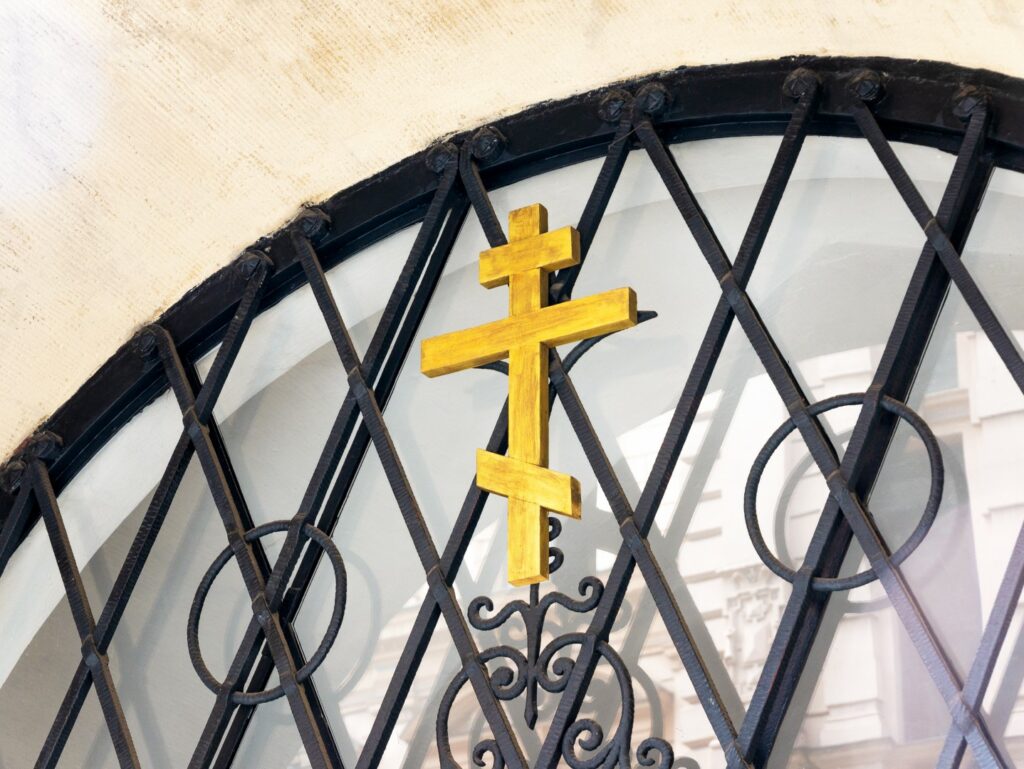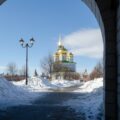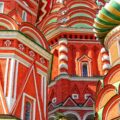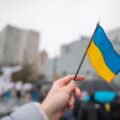The growing hold of the Moscow Patriarchate over the European Orthodox world
The growing hold of the Moscow Patriarchate over the European Orthodox world
In recent years, the Moscow Patriarchate has been extending its influence over European Orthodoxy, starting in its heartland: France.
Internal divisions over the war in Ukraine
On 3rd March 2022, Metropolitan Jean de Doubna,[1] Archbishop of the Orthodox Churches of the Russian tradition in Western Europe, signed a rare statement. In this statement, he “urges His Holiness Patriarch Kyrill5 [of Moscow] and the Holy Synod [government of the Russian Orthodox Church] to intervene firmly with the political authorities of Russia to put an immediate end to this war.” A war that he denounced, not without political courage, as “a grave sin before God.”[2]
This statement contrasts radically with the position of Metropolitan Antoine Sveryuk,[3] the exarch [representative] of the Patriarch of Moscow in Western Europe, whose seat is in the Cathedral of the Holy Trinity in Paris. He relayed a declaration in which Patriarch Kyrill called on “the parties to the conflict to do their utmost to avoid civilian casualties,” without condemning the war waged by the Russian president against Ukraine.[4]
This difference in position between these two European Orthodox leaders illustrates the divisions within the Russian Orthodox world over the war in Ukraine.[5] While some Orthodox leaders denounce the war, others, loyal to the Moscow Patriarchate, refuse to condemn it. This also provides a glimpse of the growing influence of Moscow on the European Orthodox world.
Paris, the cultural and spiritual centre of Russia in Europe
One of the most emblematic facts of this desire of the Moscow Patriarchate to regain a foothold in Europe is the inauguration with great pomp of the Holy Trinity Cathedral on 19th October 2016 in Paris.[6] This imposing religious building decorated with five golden bulbs overlooking the Seine, composes, with the adjacent Russian cultural centre, a real pole of Russian soft power. Statutorily, this cathedral built with the support of President Putin is also the chapel of the Russian embassy, an extraterritorial zone.[7]
For Jean-François Colosimo, historian and theologian specialising in the Orthodox world, this Russian spiritual and cultural complex “represents Russian Orthodoxy as desired by [Patriarch] Kyrill, that is to say, a nationalist, conservative, clerical Orthodoxy which sees Vladimir Putin as its protector.”[8] In early March 2022, when Russia declared war on Ukraine, anti-Putin tags were drawn on the cathedral’s facades. The Orthodox religious authorities decided to close the cathedral to the public. According to Jean-François Colosimo, this act of vandalism shows that in the eyes of some opponents of the war in Ukraine, this religious building is considered a lever of influence for the Russian government, which has itself subordinated the Church to the State.[9]
European competition between the Orthodox Patriarchates of Moscow and Constantinople
When it was inaugurated in 1861, the church of Saint Alexander Nevsky was the first Russian church in Paris. At that time, it depended on the Moscow Patriarchate. After the Bolshevik (atheist and anti-religious) revolution of 1917, it became the seat of the parishes of white Russian emigrants (monarchists). In 1931, the church, which had meanwhile become a cathedral, came under the protection of the Patriarchate of Constantinople with a special, provisional, and complex status that has evolved over the century. Although cut off from Moscow, the clergy and faithful will retain the Russian Orthodox tradition and rite.[10]
In 2018, the Patriarchate of Constantinople decided to dissolve the Russian Orthodox churches in Western Europe and integrate them into the Greek Orthodox jurisdictions (metropolises) of the countries where they are located. However, Archbishop John of Charioupolis, who is very attached to his church’s integrity, asked to be attached to the Moscow Patriarchate. This was in accordance with the wish of the clergy in the 1930s to return to the Moscow fold once the Soviet regime had fallen. This project caused divisions within the community, with a minority wishing to remain under the authority of Constantinople. The Russian Patriarchate accepted the request on 3rd November 2019.[11] [12]
In the background: Ukraine, a dividing line in the Orthodox world
This change of authority in the context of rivalry between Constantinople and Moscow is a winning political strategy for the Moscow Patriarchate. More broadly, this event illustrates the division of the Orthodox world, the most important dividing line of which today runs through Ukraine.[13] Indeed, in October 2018, despite warnings from the Moscow Patriarchate, Patriarch Bartholomew I officially recognised the independence (autocephaly) of the Ukrainian Orthodox Church.[14] This decision was taken against the crisis background of opposition from a large part of the Ukrainian people to the annexation of Crimea by Russia in 2014.[15] In response, the Moscow Patriarchate banned its clergy and faithful from participating in religious services in churches belonging to the Patriarchate of Constantinople.[16]
In the name of the continuity of the Russian state
In this dynamic of rivalry with the Patriarchate of Constantinople, Patriarch Kyrill can count on the help of the Kremlin. Indeed, the Patriarchate of Moscow and the Russian State, jointly, are gradually taking back control of several Orthodox religious buildings in the name of the continuity of the Russian State. In fact, legal battles between representatives of the Russian authorities and descendants of Russian exiles have taken place around the world, from Argentina to South Korea, and more particularly in France.[17]
In December 2011, the Nice Orthodox Religious Association (under the Patriarchate of Constantinople), which has been responsible for St Nicholas Cathedral since 1923, was forced by the French courts to hand over the keys of the building to the Russian Federation, which claimed ownership. After 7 years of legal battle, the Court of Appeal considered that there was “a legal continuity between the Russian Empire and the State of the Russian Federation.”[18] In February 2021, however, Russia failed to recover another Orthodox church in Nice, with the court recognising the religious association as the rightful owner after having cared for it for over a century.[19]
Putin and Cyril for the return of Holy Russia
This rivalry between the Patriarchates of Moscow and Constantinople, and the legal battles waged by the Russian authorities to recover the ownership of certain religious buildings, is part of a Russian soft power strategy. This strategy aims not only to compete with the Patriarchate of Constantinople in its universal claim – and to make Moscow ‘the third Rome’[20] – but also to make the Russian Orthodox Church the armed arm of the Kremlin.[21] “The Russian power,” underlines Vladimir Fedorovski, a French-Russian diplomat and writer of Ukrainian origin, “is the altar and politics; the real teammate of the President of the Federation is not Medvedev[22] but Patriarch Kyrill.”[23]
Want to learn more about similar topics? Go to the EARS Dashboard and receive weekly updates.
Sources
[1] Bishop Jean de Doubna (Saint Alexander Nevsky Cathedral of Paris) was called Jean de Charioupolis until 2019 when the Patriarchate of Moscow granted him the title of Metropolitan of Doubna (a city in Russia). Charioupolis was an episcopal residence during the Byzantine Empire, located in present-day Turkey and under the authority of the Patriarchate of Constantinople.
[2] Communiqué: Aide pour l’Ukraine | Archevêché des églises orthodoxes de tradition russe en Europe occidentale
[3] Since 2019, Bishop Anthony Sveryuk has been Metropolitan of Chersonese, named after a city in Crimea annexed by Russia in 2014.
[4] Message du Patriarche aux évêques, aux prêtres, aux moines et à tous les fidèles de l’Église orthodoxe russe
[5] Guerre en Ukraine. Le soutien du patriarche de Moscou au Kremlin divise l’Église orthodoxe
[6] Russian President Vladimir Putin was due to attend but cancelled his visit over disagreements with the French government over military intervention in Syria. The cathedral was consecrated on 4 December 2016 by Patriarch Cyril of Moscow. L’église russe du Quai Branly inaugurée sans Vladimir Poutine
[7] L’incroyable épopée parisienne de la cathédrale russe de la Sainte-Trinité
[8] Paris : la cathédrale orthodoxe de la Sainte-Trinité, cette « fabrique du nationalisme identitaire »
[9] Paris : la cathédrale orthodoxe de la Sainte-Trinité, cette « fabrique du nationalisme identitaire » – Le Point. On 2nd March 2022, on its Facebook page, the Russian Orthodox Spiritual and Cultural Centre of Paris, of which the Holy Trinity Cathedral is a part, posted a message that echoed the Kremlin’s anti-Ukrainian rhetoric.
[10] At the same time, deprived of a religious building, the Patriarchate of Moscow erected a church of modest dimensions in 1931: the Cathedral of the Three Holy Doctors. The Western European Orthodox landscape saw the beginnings of the divisions to come.
[11] Historique | Archevêché des églises orthodoxes de tradition russe en Europe occidentale
[12] Les orthodoxes russes d’Europe occidentale réintègrent le patriarcat de Moscou | RCF
[13] « L’Ukraine catalyse une crise au sein du monde orthodoxe entre Moscou et Constantinople »
[14] The Orthodox in Ukraine are divided. Today there are 3 Orthodox churches:
– The Ukrainian Orthodox Churh-Moscow Patriarchate
– The Ukrainian Orthodox Church-Kyiv Patriarchate (not recognised by Moscow and Constantinople)
– Ukrainian Autocephalous Orthodox Church (born out of a schism with the Church of Russia in Ukraine in 1921)
Trois Églises orthodoxes en Ukraine
[15] Sous tutelle russe depuis 332 ans, l’Eglise orthodoxe ukrainienne obtient son indépendance
[16] Après la rupture entre Moscou et Constantinople, la crainte d’un monde orthodoxe coupé en deux – Le Point
[17] Cent ans après la révolution de 1917, l’impossible réconciliation des Russes blancs
[18] La Russie récupère la propriété de la cathédrale orthodoxe de Nice
[19] La seconde église orthodoxe de Nice, convoitée par la Russie, lui échappe encore
[20] Pourquoi les Russes appellent-ils Moscou la «Troisième Rome»? – Russia Beyond FR
[21] Russie : l’Église orthodoxe, bras droit du pouvoir
[22] Prime Minister of V. Putin from 2012 to 2020.
[23] Vladimir Fédorovski. Poutine L’itinéraire secret. Paris : Editions du Rocher, 2014.






